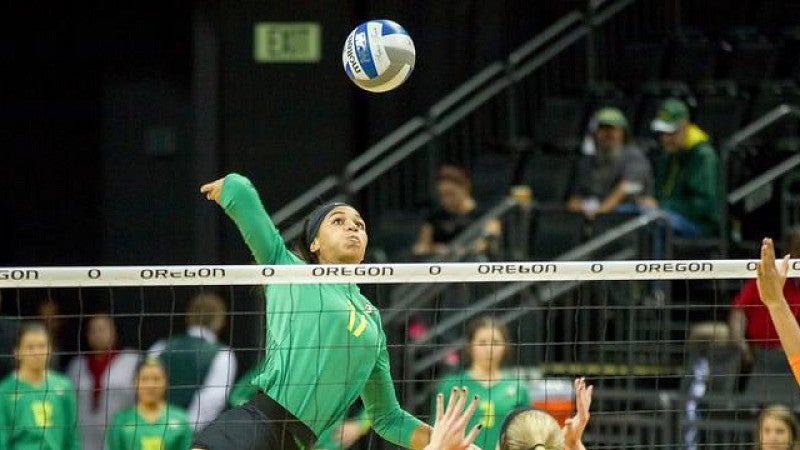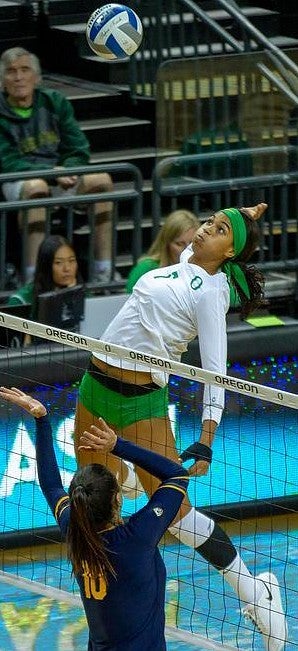Ronika Stone was in middle school when she learned you can get paid to talk about sports.
“Once I found out that was an actual job, I said that’s what I want to do when I’m done playing volleyball,” she said.
Stone completed a stand-out volleyball career at Oregon in the fall, finishing as the program’s all-time leader in block assists, not to mention being named to the All-Pac-12 team three times and being named an All-American, among other accolades.
Now she’s preparing for life after college —she hopes that includes a professional volleyball career and a spot on the 2024 Olympic team — by delving into the world of broadcasting. Last fall, she launched a video series on the GoDucks YouTube channel called “Ten Frames with Ronika,” where she chats and bowls with fellow Oregon student-athletes.
And this winter, Stone has been working as a sideline reporter on a handful of Oregon women’s basketball games broadcast by Pac-12 Networks.
Stone, a journalism major in the School of Journalism and Communication, comes from an athletic family. Her father, Ron Stone, played 13 seasons in the NFL as an offensive lineman, where he was a two-time Super Bowl champion and three-time Pro Bowler. Three of her four siblings have or had Division I athletic careers: Sister Ronna was a thrower for Oregon track and field; brother Ron is a linebacker at Washington State; and sister Ronnie was a cheerleader at Texas Christian.
She remembers watching NFL games when she was growing up with her father, who provided expert commentary on the finer points of the game.
“It’s been a part of my life so long I couldn’t imagine doing anything else,” she said. “I couldn’t imagine a life without sports.”

Stone has a powerful mentor in Maria Taylor, a broadcaster and a co-founder of Winning Edge Leadership Academy, which connects students with young professionals who mentor them in their fields of interest.
“I think she has the perfect personality” for broadcasting, Taylor said. “She has some of that unshakable personality from playing sports her entire life.”
Taylor, a two-sport athlete at the University of Georgia, works as an analyst and host for ESPN and the SEC Network, and is a member of ESPN’s College Game Day crew, which travels to college campuses each fall to highlight the big game of the week. She taped a segment last fall Duck fans may remember, driving around Eugene with Oregon quarterback Justin Herbert.
In 2018, College Game Day came to Eugene for the Stanford game, and Stone got a text from Katie Harbert, Oregon’s assistant athletic director for student-athlete development, asking if she would like to do a job shadow with Taylor. Stone said yes, and the two days she followed Taylor were memorable.
“It was way more intense than I thought it was going to be,” she said. “The early mornings, and the scripts, and having to do everything at a certain time. It’s just very organized.”
Since then, Stone and Taylor have stayed in regular touch. Stone will text or call if she has questions about an upcoming assignment. Taylor offers advice, support and recently, the clothes off her back. Both women are 6-foot-2, and Taylor cleaned out her closet and sent Stone a box of professional clothes she was no longer using.
“When she came here, everyone thought she was my big sister,” Stone said. “She’s always there if I need her. I feel really blessed to have that.”

The result was “Ten Frames with Ronika.” She’s bowled and chatted with Sabrina Ionescu from women’s basketball, football player Jordon Scott and other students from Olympic sports. Even though it’s just for fun, Stone can’t help but compete, and trash talk, just a little. She grew up bowling with her family, so she’s got a bit of an advantage.
After bowling with Scott, a very large man who plays defensive tackle for the Ducks, Stone told him, “I didn’t destroy you, but I did know I was going to win.”
“We can show their personalities and I’m able to bring out my personality,” Stone said. “It’s a good way to work on my interviewing skills.”
Stone got her first experience working as a sideline reporter last November, when she worked radio for the Civil War. Soon after, Moseley and Peterson asked if she’d be interested in working as a sideline reporter at women’s basketball games for Pac-12 Networks. Her first assignment was the Oregon-Utah game in January.
“It was really nerve-wracking,” she said. “I hated my first appearance on Pac-12, but it just made me prepare more for the next time.”
Her second stint came when Arizona State came to Oregon in mid-February and went much better, she said. She came up with a story idea that her producers loved: Oregon’s Minyon Moore and ASU’s Ja’Tavia Tapley are both USC transfers and are best friends. Stone knew this because she played basketball with Moore in junior high school and the two have stayed friends.
Stone told that story at the top of the broadcast, and then came halftime. The Ducks were leading 27-15, but Oregon Coach Kelly Graves was visibly frustrated with the Sun Devils’ physical play.
Stone asked Graves how his team would carry their momentum into the second half.
“Well that was an ugly half, there was no flow, and I’ll give you some reasons why there’s no flow, but I can’t say or else I’ll get in trouble,” an animated Graves said. “I guess that’s what (Arizona State) wants, they want a football game.”
Stone calmly asked him what changes he would make in the second half to address ASU’s physical play.
“We’ve got to settle down,” he said. “I’ve got to do a better job as coach and coach my team instead of worrying about the three people in stripes. We’ve got to be stronger inside.”
Responding calmly to a fired-up coach is “the stuff you can’t teach,” Taylor said. “It has to come naturally.”
David Koppett, vice president for content production and strategy at Pac-12 Networks, said Stone made great strides between her first and second assignments.
“A great part of working with a stand-out student-athlete is they can take coaching and they know how to prepare,” he said. “I think she seemed a lot more comfortable (in her second game). She did a great job.”
The network doesn’t yet have an organized program for students to work on its broadcasts, but that may change, Koppett said.
“It’s an ambition here to start doing this in a more organized way,” he said. “We feel it’s a unique opportunity to offer our student-athletes the kind of professional experience you can’t get most places.”
Also, he said, the network would like some of those fledgling broadcasters to work for the Pac-12.
Stone’s next steps will be with Taylor’s organization, the Winning Edge Leadership Academy. Stone said she’s been offered an internship, which will include shadowing Taylor at the Final Four and may include helping cover the NBA playoffs, she said.
After that? She hopes to play volleyball professionally overseas and vie for a spot on the 2024 Olympic volleyball team. She sees herself playing volleyball through 2024 or maybe 2025 before trying to launch her broadcasting career.
“I’ll try to brand myself as much as possible overseas so people don’t forget me,” she said, smiling, “and pick up where I left off.”
—By Tim Christie, University Communications

